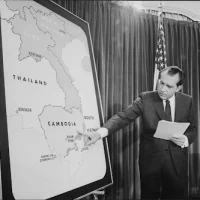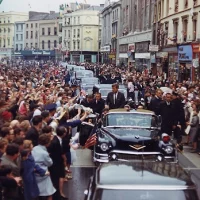In 1991, the U.S. led a coalition of over 30 nations to force Iraqi troops out of Kuwait after Saddam Hussein ordered the invasion and annexation of the small oil-rich country. Although the invasion caught many throughout the world by surprise, those who had worked in the Middle East had been seeing tensions rise for… Read More "A Day of Mixed Messages over Iraq’s Invasion of Kuwait"
When President Richard Nixon took office in 1969, he and National Security Adviser Henry Kissinger vowed to find a way to end U.S. involvement in Viet Nam quickly and honorably without appearing to cave in to communist pressure. The U.S. launched a secret air campaign, thirteen major military operations, against North Vietnamese bases in Cambodia.… Read More "The U.S. Incursion into Cambodia"
Relations between the U.S. and Ireland have traditionally been strong, thanks to common ancestral ties, history and shared values. Irish citizens immigrated to the thirteen Colonies, fought in the War of Independence and were among the first to drive cattle westward. Prompted largely by the Great Irish Famine, from 1820 to 1860 two million Irish… Read More "Ireland and the U.S.: The Best of Friends, Except When They Weren’t"
Crisis Management: Occupation of USIS in South Korea, 1985
On May 25, 1985, seventy-three South Korean students barged into the United States Information Services (USIS) library in Seoul and began a three-day occupation. The students’ primary demand was an apology from the U.S. Ambassador, Richard L. “Dixie” Walker, as the representative of the American government, for the United States’ alleged role and complicity in… Read More "Crisis Management: Occupation of USIS in South Korea, 1985"
Negotiating the Mexican-American Border: the Case of Chamizal
Defining the border between Mexico and the United States has not always been in the hands of politicians; at one point, a shift in the Rio Grande River created a new boundary and generated a diplomatic dispute. In February 1848, the Treaty of Guadalupe-Hidalgo ended the Mexican-American War and designated the Rio Grande the boundary… Read More "Negotiating the Mexican-American Border: the Case of Chamizal"
Brass Tacks and Kashmir: India-Pakistan Military Crises in the 1980s
A crisis between India and Pakistan erupted between November 1986 and March 1987 after India launched the largest-ever military exercise in the subcontinent, called Operation Brass Tacks. The exercise took place in the desert area of Rajasthan, a few hundred miles from the Pakistani border, and included nine infantry, three mechanized, three armored and one… Read More "Brass Tacks and Kashmir: India-Pakistan Military Crises in the 1980s"
Basketball: the Fifth Basket of the Helsinki Final Act
The Helsinki Final Act, an agreement signed by 35 nations at the Conference on Security and Cooperation in Europe (CSCE) on August 1, 1975, addressed a spectrum of global problems and had a lasting impact on U.S.-Soviet relations. The Helsinki Final Act dealt with a variety of issues divided into four “baskets.” The first basket… Read More "Basketball: the Fifth Basket of the Helsinki Final Act"
Negotiating the Limited Test Ban Treaty (LTBT)
Due to rising concern about radioactive fallout from increasingly big nuclear tests underwater, in space, in the atmosphere and underground, as well as concern over the burgeoning arms race between NATO and Warsaw Pact countries, the US, UK, and USSR decided to negotiate a test-ban treaty. These concerns became more pronounced after the United States… Read More "Negotiating the Limited Test Ban Treaty (LTBT)"
Chipping Away at Czechoslovak Communism: The Helsinki Final Act and Charter 77
The Solidarity Movement. Perestroika and Glasnost. The fall of the Berlin Wall. All of these movements, policies, or events had a tremendous influence on the dissolution of communism in Eastern Europe and the end of the Cold War. While not attributed the same attention and certainly less well known, many diplomats operating behind the Iron… Read More "Chipping Away at Czechoslovak Communism: The Helsinki Final Act and Charter 77"
Bombing North Vietnam into Accepting Our Concessions: Christmas Bombings, 1972
President Richard Nixon ordered plans for retaliatory bombings of North Vietnam after talks to end the war in Vietnam broke down December 13, 1972. Operation Linebacker II, otherwise known as the “Christmas Bombings,” began December 18 and lasted for two weeks. A total of 741 B-52 sorties were dispatched, dropping 20,000 tons of bombs on… Read More "Bombing North Vietnam into Accepting Our Concessions: Christmas Bombings, 1972"


